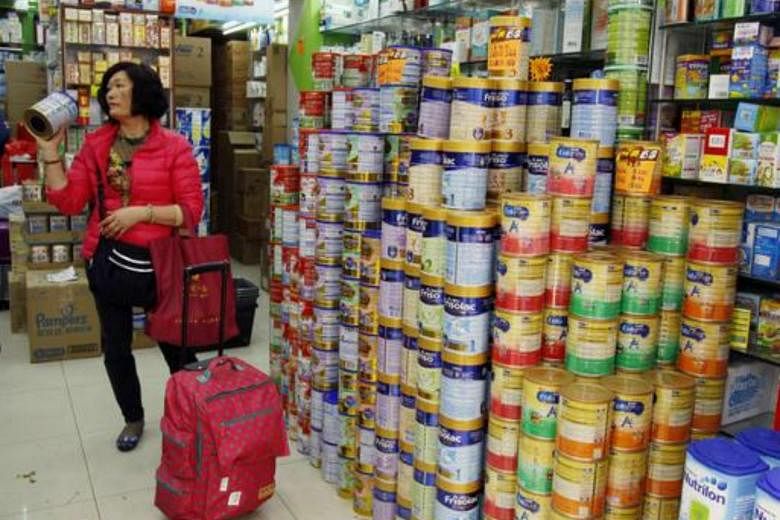BEIJING (BLOOMBERG) - Chinese infant formula producers are going global to regain market share at home after a melamine scandal almost a decade ago crippled consumers' trust in locally-made products.
Feihe International is the latest company to invest in overseas manufacturing, spending C$300 million (S$326 million) to build a plant in partnership with Canada Royal Milk in Ontario. That follows similar moves by Inner Mongolia Yili Industrial Group, which has invested in plants in the United States and New Zealand, and Yashili International Holdings.
Foreign companies still have a lock hold on China's US$19.5 billion (S$26 billion) infant formula market after melamine-tainted formula led to the deaths of at least six babies and sickened tens of thousands in 2008.
With consumers weary of food scandals, domestic brands continue to struggle to capture market share despite tough government regulations aimed at rebuilding confidence, rigorous inspections and crackdowns on offenders.
Now some companies are looking to make formula overseas and then sell it to consumers back home.
"China's quality inspections have improved significantly," said Mr Wang Dingmian, former president at Guangdong Dairy Association. "However, the industry is having problems convincing consumers."
That distrust has been a boon for overseas companies to surging demand that has seen milk formula sales value almost double between 2011 and 2016, according to a Euromonitor International report.
Nestle, Danone, Mead Johnson Nutrition, Royal FrieslandCampina, American Dairy, and Abbott Laboratories account for more than 50 per cent of China's market, according to data from the market researcher. Inner Mongolia Yili has carved out a 5.4 per cent share.
Domestic makers, resigned to consumer distrust despite government assurances, are increasingly taking a new tack: If they cannot beat foreign competitors on their home turf, why not join with them.
"I see partnerships as a good way for Chinese companies to invest overseas, especially in advanced economies," said University of Sydney Business School lecturer Li Wei. The other motivation "is to expand their supply chain, which gives them more control over quality and enables them to capitalise on the huge demand in the Chinese market".
China Animal Husbandry Group, which has a majority stake in Mataura Valley Milk, last year invested in building a powder plant in New Zealand. Beingmate Baby & Child Food bought 51 per cent of an Australian plant from Fonterra Co-operative Group last year.
"Since 2008, consumers have lacked confidence in domestic brands and blindly hold foreign products in esteem," said Mr Zhu Guogang, deputy manager of public affairs at Yashili, which partnered with Denmark's Arla Foods to develop a premium formula product called Baby & Me.
Now, he said, domestic brands are too similar and compete mainly on price.
Rebuilding In 2008, authorities found that melamine, widely used to make plastics, was added to diluted milk to make the protein content appear higher. But the chemical can also interfere with normal functioning of kidneys, and sickened tens of thousands.
Sanlu Group, one of 22 companies that sold tainted formula, went bankrupt in December 2008.
"After these incidents, we basically handed over the market to foreign companies," said chief scientist Wu Yongning at China National Centre for Food Safety Risk Assessment, referring to the 2008 case and another in 2004 in Anhui province where fake infant formula was sold to families, causing the death of 13 babies and malnutrition in about 170 infants.
In order to rebuild the market, the government has established what Mr Wu describes as the most stringent infant formula requirements in the world. "But mothers just won't trust" domestic brands, he said.
The National Health and Family Planning Commission published a series of documents in 2010 to regulate dairy products including requirements for nutritional content and standards for manufacturing and transportation. China requires domestic and foreign infant formula makers to register with the China Food and Drug Administration and limit the number of products and brands produced.
Years later, memories remain sharp. Ms Sophia Li, a mother of a two-month old baby in the southern city of Guangzhou, said she now asks a relative in Australia to bulk mail infant formula directly from a warehouse there. "I don't trust domestic brands," she said.

